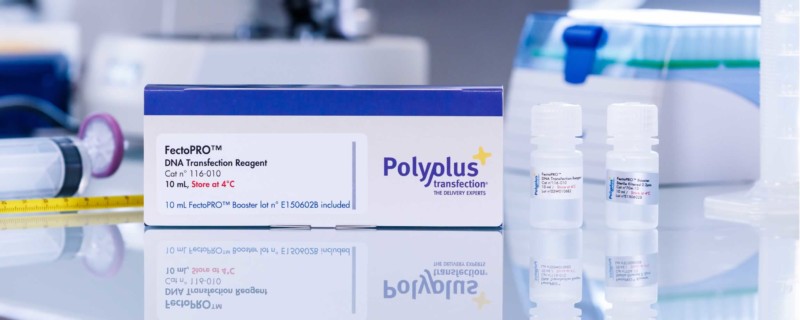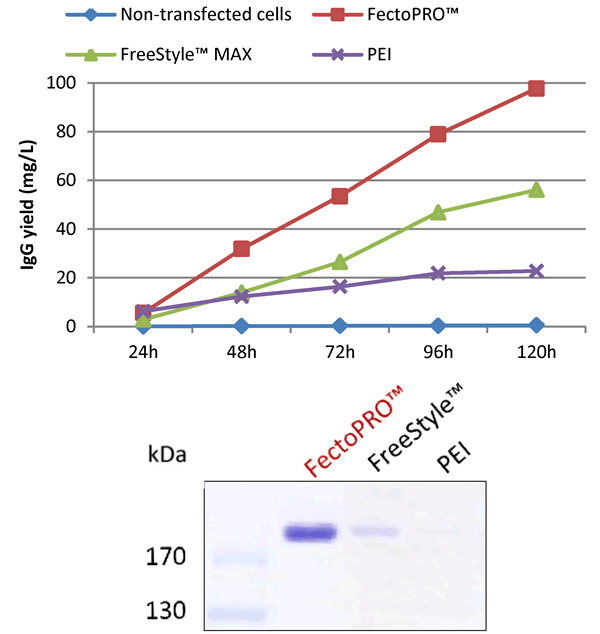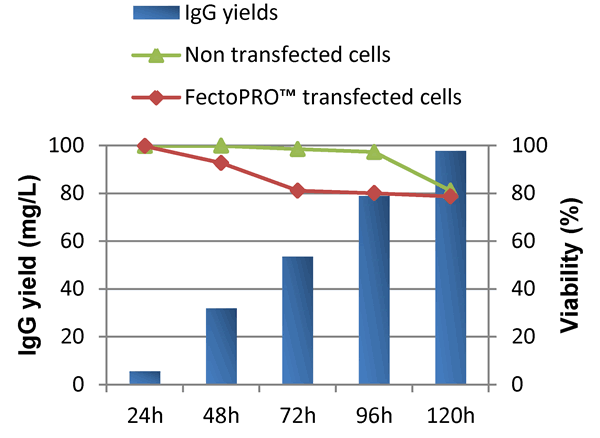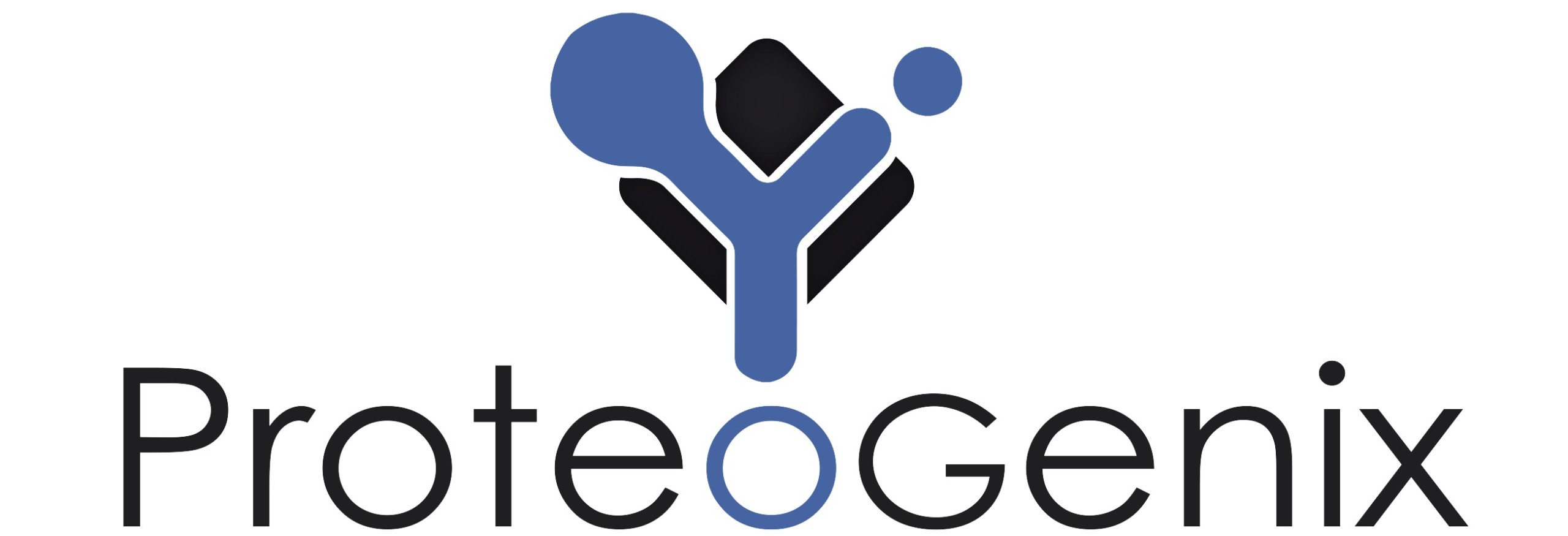
Improved Protein yields in CHO and HEK293 cells using a dedicated transfection reagent: FectoPRO®
Jelena Vjetrovic1, Valérie Kedinger1, Raphaël Hopfner2, Philippe Funfrock2
Introduction
Transient gene expression (TGE) is commonly used for medium scale production of recombinant proteins and antibodies. This approach allows generation of sufficient protein amounts without an investment in production of stable cell lines prior to “proof of concept” studies or tools validation. The speed and flexibility of the process has enabled TGE to be widely adopted in bioproduction for early discovery, research applications and process development.
However, the protein yields usually remain lower with TGE than with stable clones, making transfection a bottleneck in many bioproduction processes. In order to address this issue and improve productivity, Polyplus-transfection® has developed a novel powerful transfection reagent to generate superior protein amounts by TGE in HEK-293 and CHO cells.
FectoPRO® transfection reagent was designed after extensive screening of numerous chemical structures based on their transfection efficiency, protein production yield and cell viability. It is highly efficient for transfection of suspension CHO and HEK-293 cells in various serum-free media, using low DNA amount (< 1 µg/ml of cell culture).
ProteoGenix is a leading CRO offering biotherapeutic and diagnostic development services to the life science community. ProteoGenix performs customized protein production in different systems (E.coli, B. Subtilis, yeast, insect cells, mammalian cells), including high quality protein production in mammalian HEK 293 and CHO cells by TGE.
ProteoGenix compared FectoPRO® to other transfection reagents commercially available and concluded that FectoPRO® clearly outperforms both PEI- and lipid- based reagents. Unprecedented protein yields were reached in both CHO and HEK-293 cells, hence FectoPRO® is the reagent of choice to generate high quality protein yields.
Results
Production of full mouse IgG was assessed 24 to 120h post-transfection. At all time points analyzed, FectoPRO® largely outperformed other transfection reagents commonly used in bioproduction processes in terms of protein yields (Fig. 1). Furthermore, five days after transfection with FectoPRO® protein yields in suspension CHO cells reached 100 mg/L, while only 55 mg/L were reached after FreeStyle™ MAX mediated transfection.

In addition, cell viability remained very high 5 days after transfection with FectoPRO®, reaching comparable levels as non-transfected cells (Fig. 2). Maintained high cell viability allows consistent protein production, leading to the extremely high protein yields observed.

Material and Methods
Transfection
CHO cells, cultured in Gibco® FreeStyle™ CHO Expression Medium (Life Technologies™), were transfected with several transfection reagents including FectoPRO®, by using vectors coding for the heavy (HC) and the light (LC) chain of a recombinant mouse IgG (Proteogenix’s pTXs1-HC and pTXs1-LC plasmids) and a proprietary booster plasmid.
For transfection with FectoPRO®, a total of 0.8 µg of DNA was used per ml of cell culture, with a 1:1.5 (µg to µl) DNA to FectoPRO® ratio. Previously optimized conditions were used for other reagents (FreeStyle™ MAX and PEI). Transfected cells were analyzed 1 to 5 days post-transfection.
IgG quantification
Protein quantification was performed using an Octet® RED96 system (fortéBIO®) according to manufacturer’s instruction by using protein G Biosensors (Dip and Read™ Protein G (ProG) Biosensors, fortéBIO®). Transfection analysis was done at several time-points and the quantity of IgG in each sample was calculated by the integrated Octet® RED96 software.
Qualitative analysis of IgG production
Samples collected at each time point were loaded on 8% non- reducing PAGE after a semi-purification procedure. Briefly, 100 μl of culture medium was incubated with 10 μl of protein G sepharose for 30 min with agitation at room temperature. Protein G resin was then harvested, mixed with one volume of Laemmli sample buffer, and loaded on PAGE.
Determination of cell viability
Cell viability was determined by dye exclusion method with trypan blue reagent. Briefly, cells were mixed at 9:1 ratio with 0.4% trypan blue solution. Cell density and viability was determined with a disposable hemocytometer.
Altogether these data show a real advantage of using FectoPRO®for protein and antibody production with TGE in mammalian cells compared to commonly used technologies. FectoPRO® leads to unmatched protein and antibody production yields, while maintaining high cell viability during the whole production process. ProteoGenix is proud to use this state-of-the-art technology from Polyplus-transfection to meet its customers’ timelines and quality requirements.


Footnotes
-
1. Polyplus-transfection®, Bd S Brandt, Illkirch 67400, France, support@polyplus-transfection.com
-
2. ProteoGenix, 15 rue de la Haye, Schiltigheim 67300, France, contact@proteogenix.fr